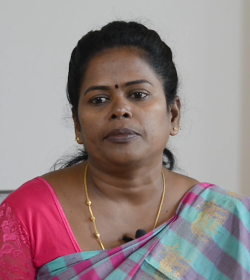3 Questions for
Thivya Rakini | Tamil Nadu Textile and Common Labour Union
Thivya Rakini is the State President of the women-led Tamil Nadu Textile and Common Labour Union (TTCU). With the Dindigul Agreement, the TTCU negociated the first legally binding agreement on gender-based violence in Asia, a "landmark agreement".

1. What is the situation of women* in textile supply chains?
The situation of women* workers in textile production, which supplies European countries, has hardly improved in the last two decades. The audits and CSR initiatives have hardly changed the culture of gender-based violence that is commonplace in most factories.
2. What must be done to improve the situation of women* in textile supply chains?
I think brands are the main actors that can change this culture. Brands should implement ILO Convention 190 for garment workers by signing agreements involving garment workers, suppliers and trade unions to eliminate gender-based violence. The Dindigul Agreement also works to eliminate gender-based violence. With the Dindigul Agreement, we were able to work with a local supplier to address more than 160 complaints from women* in one year. We have also noticed that the productivity and efficiency of the factory has improved. We hope that all brands will join the Dindigul Agreement, or sign similar agreements with our trade union partners in Asia Floor Wage Alliance in producing countries.
3. If you could change one thing over night in the textile industry, what would it be?
Freedom of Association (FOA) is the key enabling right that will help garment workers to truly access all other freedoms and rights. A failure to truly ensure FOA will keep women* workers at constant risk of gender-based violence. We hope brands and suppliers recognise this, and engage with local level trade unions and their global partners, so that decent work and good industrial relations becomes the reality.

